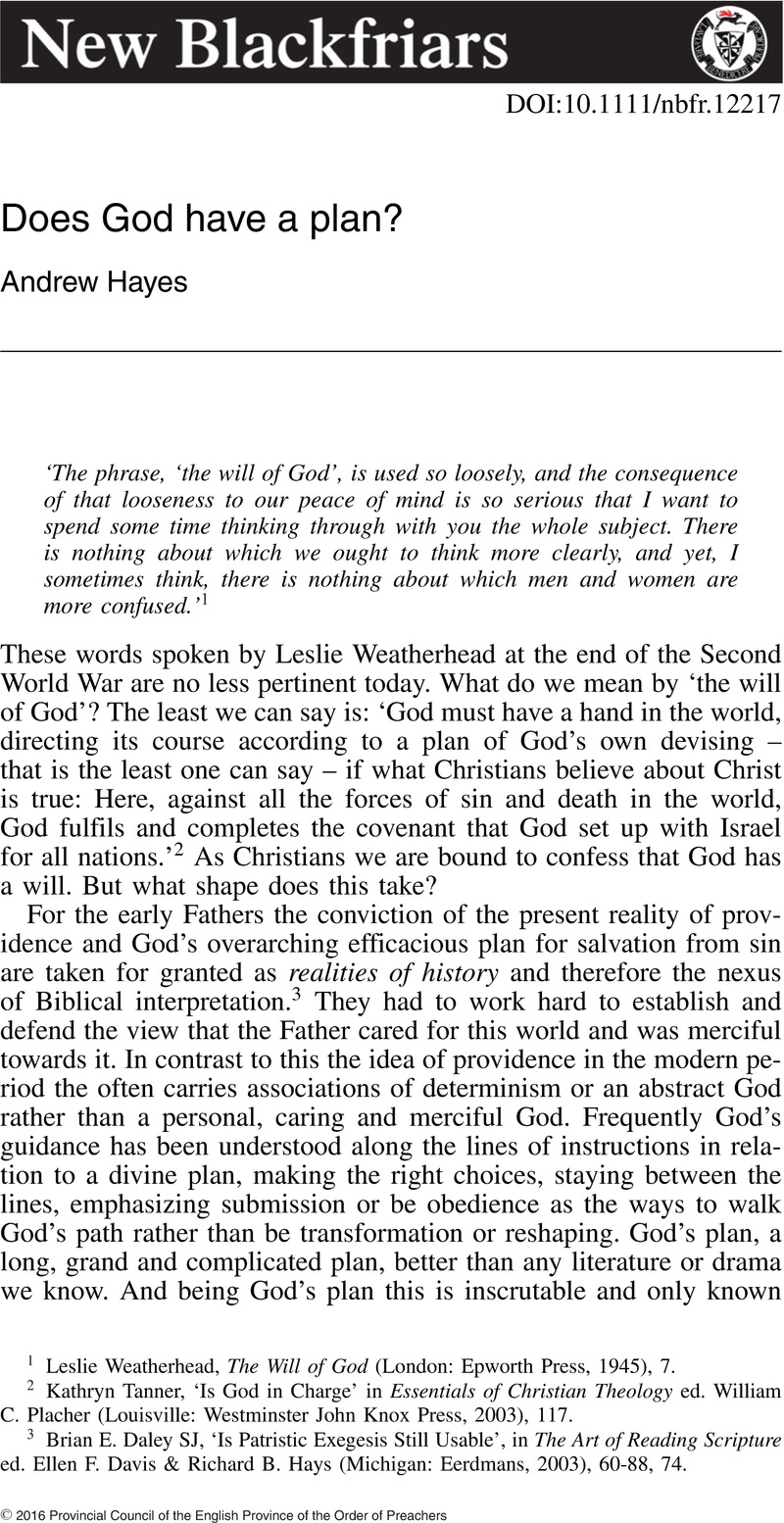No CrossRef data available.
Article contents
Abstract

- Type
- Original Article
- Information
- Copyright
- Copyright © 2016 Provincial Council of the English Province of the Order of Preachers
References
1 Weatherhead, Leslie, The Will of God (London: Epworth Press, 1945), 7Google Scholar.
2 Tanner, Kathryn, ‘Is God in Charge’ in Essentials of Christian Theology ed. Placher, William C. (Louisville: Westminster John Knox Press, 2003), 117Google Scholar.
3 Daley SJ, Brian E., ‘Is Patristic Exegesis Still Usable’, in The Art of Reading Scripture ed. Davis, Ellen F. & Hays, Richard B. (Michigan: Eerdmans, 2003), 60–88, 74Google Scholar.
4 Williams, Rowan, Ray of Darkness (Boston: Cowley Publications, 1995), 147–148CrossRefGoogle Scholar.
5 Ibid.
6 I am hesitant to attach it too readily to Calvin and am minded to think it develops out of particular readings of the monarchical analogies for God in the Bible. The sovereignty of God is a respectable emphasis in the Reformed tradition but it is important that sovereignty when discussed in relation to God, as with all things, is not univocal with national or monarchical sovereignty. God does not need policies and coercion, God's total otherness and freedom secure that God's sovereignty is of another kind, a non‐competitive kind. Cf. Williams, Rowan, On Christian Theology (Oxford, Blackwell, 2000), 69Google Scholar.
7 It is not for this article to discuss but there is much of importance to be said about the ways humans are much more than thinking and deciding beings – more than intellects – and that God the image of God in humanity is not reducible to planning and choosing. Disability theology has much to say here about what the human person is and how he/she can relate to God in ways that are not confined to the intellectual sphere.
8 Pohier, Jacques, God in Fragments, (London: SMC Press, 1985), 266Google Scholar.
9 The account I will offer of this is indebted to Herbert McCabe OP who so deeply understood the wisdom of and eloquently expressed God's not being a creature. McCabe wrote very little in which this topic does not emerge but his God Matters really takes the issue head on so I will rely on this text. Rupert Shortt's recent apologetical piece God is no Thing is also instructive in this regard.
10 McCabe, Herbert, God Matters, (London: Bloomsbury, 1999 14Google Scholar.
11 McCabe, God Matters, 8.
12 Tanner, Kathryn, God and Creation in Christian Theology (Oxford: Blackwell, 1988), 73Google Scholar.
13 Herbert McCabe puts across the sense of this beautifully against those who think that God's impassibility is an impediment to his compassion. God Matters, 44.
14 Wood, Charles M., The Question of Providence (Louisville: Westminster John Knox Press, 2008), 84Google Scholar.
15 Calvin, Against the Libertines, 13.
16 Turner, Denys, Thomas Aquinas: A Portrait (New Haven: Yale University Press, 2013), 157Google Scholar.
17 Summa Contra Gentiles 3.70.8, Summa Theologica I.23.8.
18 McCabe, God Matters, 7.
19 CD III/3, 145‐147.
20 Denys Turner in his account of Thomas recalls a conversation with a friend who characterised Protestant theology in general as an ‘either/or’ relationship in contrast to Catholic ‘both/and’. Turner does not rely on this but Barth suggests otherwise and Barth, though critical, is of rather than anomalous in his Reformed tradition. There are least suggests – on the libertines being one – that Calvin should not be considered an ‘either/or’ thinking primarily either. Green, Christopher C., Doxological Theology: Karl Barth on Divine Providence, Evil and Angels (London: T&T Clark, 2011), 83Google Scholar. Turner, Aquinas, 153‐54.
21 Ibid, 149.
22 Green, Doxological Theology, 85.
23 CD III/3, 270.
24 I am thinking here of Dallas Wilard and Gary Friesen. David Runcorn also sits quite well in this company.
25 Tanner, Creation, 73.
26 This example is adapted from one by the late American phenomenologist and popular Christian writer Dallas Wilard: Willard, Dallas, Hearing God: Developing a Conversational Relationship with God (Illinois: Intervarsity Press, 1999), 10–11Google Scholar.
27 Ibid, 76.
28 Machuga, Ric S., Three Theological Mistakes: How to Correct Enlightenment Assumptions about God, Miracles, and Free Will (Cambridge: James Clark & Co, 2015), 190–191CrossRefGoogle Scholar.
29 Calvin, Against the Libertines, 14.
30 Ibid.
31 Green, Doxological Theology, 85‐6.
32 This raises the pertinent question of the role of prayer with reference to providence. This is a very important area and was given a great deal of attention by Barth in CDIII/3 as part of the doctrine of providence. This is notoriously one of the most difficult sections of CD to contextualise because this is a very subtle yet significant question. Suffice to say for now that the modal distinction is operative here as elsewhere. Prayer might not be best thought of as appeal outside of the world but as an address to God as God meets us in this world, appropriate to our creaturely experience. See Cocksworth, Ashley, Karl Barth on Prayer (London: Bloomsbury, 2015)Google Scholar.
33 Turner, Aquinas, 167‐68.


